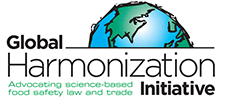South Africa
Ambassadors

Dr. Lucia Anelich, PhD
South African Association for Food Science and Technology (SAAFoST)
President

Prof. Gunnar Sigge, PhD
South African Association for Food Science and Technology (SAAFoST)
Council & Exco Member

Prof. Dr. Thierry REGNIER
Research Professor
Tshwane University of Technology

Prof. Belinda Meiring
Associate Professor
Department of Biotechnology and Food Technology, Faculty of Science
Tshwane University of Technology, Pretoria, South Africa
ORCID page
Ambassador’s Report
SAAFoST is the Association for Food Scientists, Technologists and other Professionals serving the food and allied industries in South Africa. The organisation provides its members with valuable networking and knowledge-sharing events and publications. SAAFoST promotes education and professionalism as well as an appropriate legislative structure in the industry.
Food standards should be developed in such a way that they do not present a barrier to trade, whilst simultaneously affording adequate protection for consumers of those countries. Most countries in Africa are members of the Codex Alimentarius Commission (CAC) and members of the WTO. It therefore follows that Codex Alimentarius standards are regarded as the minimum standards that these countries should comply with, not only for conducting international and regional trade, but also for providing safe and nutritious food for the domestic population.
All countries in Africa have food standards. However, these range from very few and rudimentary standards to antiquated standards developed during colonial times to more modern standards reflecting the spirit of the WTO and the CAC. Consequently, projects exist within Regional Economic Communities to harmonise existing food standards. However, many existing food standards are not based on scientific principles as per the SPS Agreement and cannot be justified scientifically.
There is a general lack of scientific capacity in many countries in Africa. Capacity building will require political will as a first step, followed by policy development and long-term strategies for maintaining that capacity in a particular country. This is vital to enable effective participation in relevant regional and international forums such as the Regional Economic Communities and the CAC, respectively. These developments should, however, go hand in hand with harmonisation of food standards at regional
and international levels, in order to facilitate trade.
Prof. Thierry Regnier:
The aim is to promote awareness on the need for a strong and reliable global harmonization of food safety regulations, especially in Africa. My first aim is to talk to our new generation of food technologists and explain the role of the GHI. I am planning to talk to people about the GHI at the Food Technology Congress in Abu Dhabi in April.
Prof. Belinda Meiring:
Recent foodborne illness outbreaks in South Africa, with over 890 reported cases and 23 tragic fatalities between September and November 2024 - most involving schoolchildren - highlight an urgent need for action. As a GHI Ambassador, I am committed to advancing GHI's mission to ensure the global availability of safe and wholesome food through science-based regulations and collaboration. I shall actively engage with local and regional food scientists, regulators, and policymakers to share critical information, disseminate GHI materials, and encourage membership to strengthen GHI’s presence in South Africa. As a passionate advocate for food science education, I plan to introduce the GHI School Food Safety Club in South Africa to provide students with essential training in proper food handling, preparation, and storage. This initiative will not only reduce the risk of foodborne illnesses, but also empower students to champion food safety within their families and communities, fostering long-term public health benefits. Additionally, I will participate in GHI conferences to connect with global members and stakeholders, ensuring that South Africa actively contributes to and benefits from GHI’s global harmonization efforts.
Publications
Title: African Perspectives on the need for global harmonization of food safety regulations
Author: Lucia ECM Anelich
Publication and Date: Journal on the Science of Food and Agriculture, 2013
Link: https://onlinelibrary.wiley.com/doi/abs/10.1002/jsfa.6465
Title: Ensuring Global Food Safety
Chapter title: Development of Food Legislation Around the World: South Africa
Year of publication: 2010
